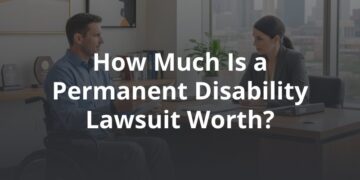When you injure your back at work, your first thought is not likely going to be to call a spinal injury lawyer. In fact, many people may not think anything about their injury at all, or they try to tough out the pain and push through. Even when employees report their back injuries immediately to employers, they may be ignored or dismissed by their employer or the insurance company. The myth of the bad employee is especially harmful for workers with invisible back injuries like spinal injuries or soft tissue sprains and strains.
Whether you report your injury right away or realize afterward that it is worse than you first thought, how realistic is it that you will receive the support you need from workers’ compensation? Read on to learn more about how to prove a back injury at work.
What Kinds of Back Injuries Commonly Happen at Work?
Employers in the United States are no stranger to back injuries. According to the U.S. Bureau of Labor Statistics, over one million workers suffer a back injury every year, accounting for one in five of all workplace injuries. In 2020 alone, private employers reported almost 130,000 back injuries that resulted in lost work time — around 40 percent of all musculoskeletal injuries.
Work-related back injuries generally fall into three categories:
- Force. As the most common cause of workplace back injury, force injuries might include those that come from falls on oil rigs or a commercial trucking accident. However, force injuries also occur from lifting or carrying, which make up the majority of back injuries that happen at work.
- Repetition. Just as dangerous as lifting heavy objects, repetitive motions — whether light lifting, bending, or twisting, can result in injury and chronic pain.
- Inactivity. Sitting for long periods of time can also injure the back, neck, and spine. Whether you work in collecting tolls, driving a bus, or developing software, sitting too much can be as bad for your body as lifting heavy objects.
When it comes to workplace injuries, the Department of Labor’s statistics on musculoskeletal disorders (MSDs) only includes those injuries that come from bodily reactions — such as bending, climbing, crawling, reaching, twisting — not from falls or car accidents. The most common job-related back injuries are MSDs:
- Strain. Overused or overstretched muscles
- Sprain. Torn ligaments from sudden movement
- Herniated disk. Loss of the spine’s cushioning ability from strain or age
While MSDs are by far the most common kind of back injury, transportation-related accidents still make up a large portion of workplace accidents, especially when it comes to heavy and tractor-trailer trucks. Nearly 50,000 truck drivers filed workers’ comp claims in 2018, making it the second-highest injury rate of any industry that year.
Regardless of how you injured your back, lost work time means missed income. Injury means medical bills. When your injury has occurred at work, you may expect you can count on your employer and their insurance company to make sure you and your family are taken care of while you focus on healing — but it may not always be as easy as filing a workman’s comp claim.
Can I Get Compensation for Injury at Work?
Many people know about workman’s comp — a form of insurance regulated by the state of Texas and usually provided by private insurance companies. However, the state does not require private companies to have workers’ comp coverage. In most cases, workers’ compensation is the protection an employer has against lawsuits when employees are injured. Employers with no workers’ comp insurance are called non-subscribers, and if an employee is injured while working for a non-subscriber employer, the Texas Labor Code allows employees to sue their employers for damages.
When an employer does not have workers’ comp coverage or if someone other than the employer could be found at fault, you may still have options for taking legal action:
- If an employee is driving a company vehicle and is struck by a negligent driver, Texas law allows the injured employee to file a claim against the negligent driver.
- If an employee is injured on the job because of a defective or malfunctioning tool or piece of equipment, a lawsuit may be filed against the product manufacturer or vendor.
- An employee who delivers a package to a third-party destination and is injured on the property of the delivery destination may be allowed to bring legal action against the owner of the property.
These are just a few examples of how workman’s comp insurance is not the only option for recovering damages in a work-related injury case. In today’s professional environments, complicated business arrangements that rely on third-parties and contract workers mean that seeking compensation for an injury at work is not always as cut-and-dry as it may seem. Third-party liability cases are an important part of the way those without access to workers’ compensation are empowered by the law to seek compensation for their injuries and losses.
How Can I Prove My Back Injury at Work?
The complicated part of proving a back injury happened at work is that insurance companies may try every tactic under the sun to prove it did not, especially if the injury is severe. In order to prove that the injury is work-related, you will need to prove one or both of the following conditions:
- The work environment and the performance of your work contributed significantly to your condition; and/or
- The condition was made worse or persisted longer due to your work conditions
Some people think that spinal injury claims are only for people who were not injured at all and then are suddenly injured at work, but that is not true. While it might be more difficult, especially without legal help, it is possible to recover damages even if your initial injury is not work-related but is made worse by working. Or, you may have been injured at work previously and re-injured yourself down the line. Back injuries are complicated because there are a number of different causes for back pain, and sometimes even a combination of causes.
Whenever your work is a contributing factor to your back injury, here are a few steps you can take to help yourself get the benefits you need after your injury:
- Immediately report your injury. Texas generally requires injured employees to report their injuries to their employers within 30 days from the date of injury or from the date they knew your injury or illness was work-related. However, as with any injury, you should always report it as soon as possible rather than waiting.
- Get medical attention right away. The best way to care for your health as well as start a strong documentation trail is by getting medical attention. If you are not sure if you can afford it or where to go that you can trust, call an injury attorney for guidance and possibly referrals.
- Call a spinal injury lawyer. If you are not calling an attorney for a list of places to get medical care, you should at least be calling them to get a sense of your rights, responsibilities, and the best next steps in order to protect yourself.
- Stick to doctor’s orders. You may find yourself not earning income or on strict work restrictions. While you may feel desperate to earn a living or get back to a life as normal as possible, going against a doctor’s orders may really hurt your case.
Is It Worth Hiring an Attorney for My Back Injury?
Recovering compensation for back injuries can be complicated, but an experienced injury attorney can help you navigate the process. An attorney can advocate for you by educating you about your rights, helping you find the best medical care for your back injury, and by stepping in if you experience roadblocks or are denied.
You probably don’t expect to be an expert at doing every single job at your place of work. The same logic applies when it comes to getting help for your back injury. When it comes to complex workplace injuries like this, not every medical professional will have the expertise to diagnose appropriately or predict the proper scope of future impacts. Not every injury attorney will have the investigative resources and know-how to make sure that your claim is not unfairly denied based on poorly understood medical evidence. It may even be necessary to look into your company’s safety and training practices in order to provide evidence that proper precautions were not taken to prevent injury.
A 2006 report from the RAND Corporation on the quality of health care delivered to adults in the United States identified some striking findings when it came to back injuries. Patients with low back pain received full screening and diagnostic treatment in only about 30-50 percent of cases. When you are injured and under stress, it can be hard enough to take care of day-to-day tasks, let alone make sure your medical team is adhering to the highest standard of care.
How Can FVF Help?
You don’t have to go through the process of a back injury case alone and confused. Our experienced attorneys have handled hundreds of injury cases over the years — and we don’t take cases if we don’t believe that hiring FVF adds enough value to your recovery to cover the cost of hiring a lawyer and then some. Even if we don’t end up representing you in proving your back injury happened at work, we believe information and education are two of the strongest tools we can help you with.
We invite you to contact us for a free ,no-obligation consultation to talk about your case. Together, we can discuss your options and help you decide how to move forward.








